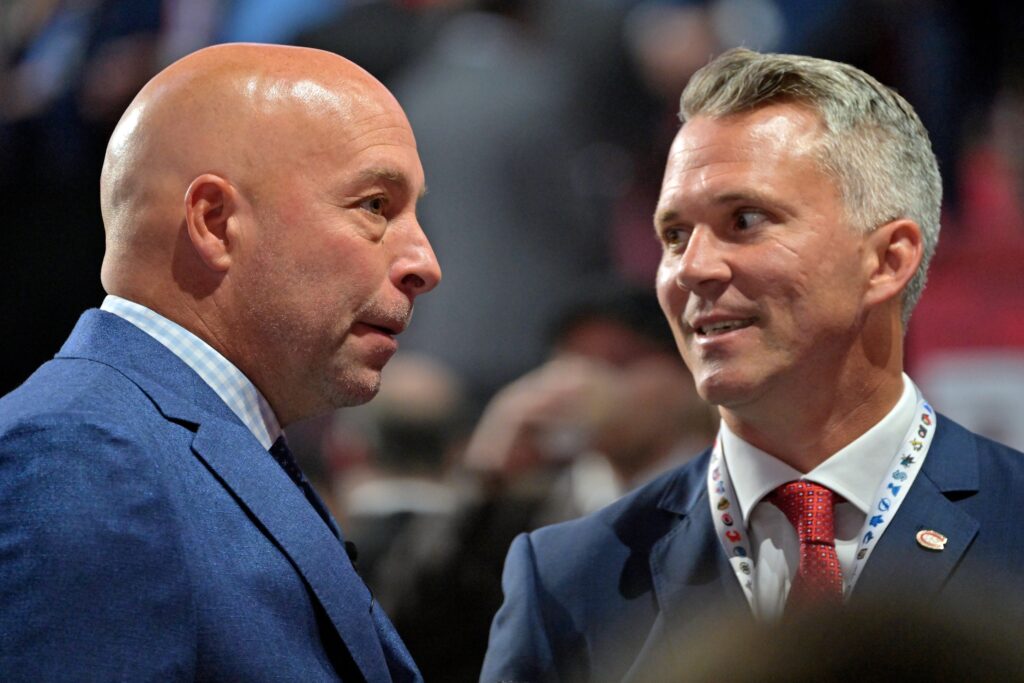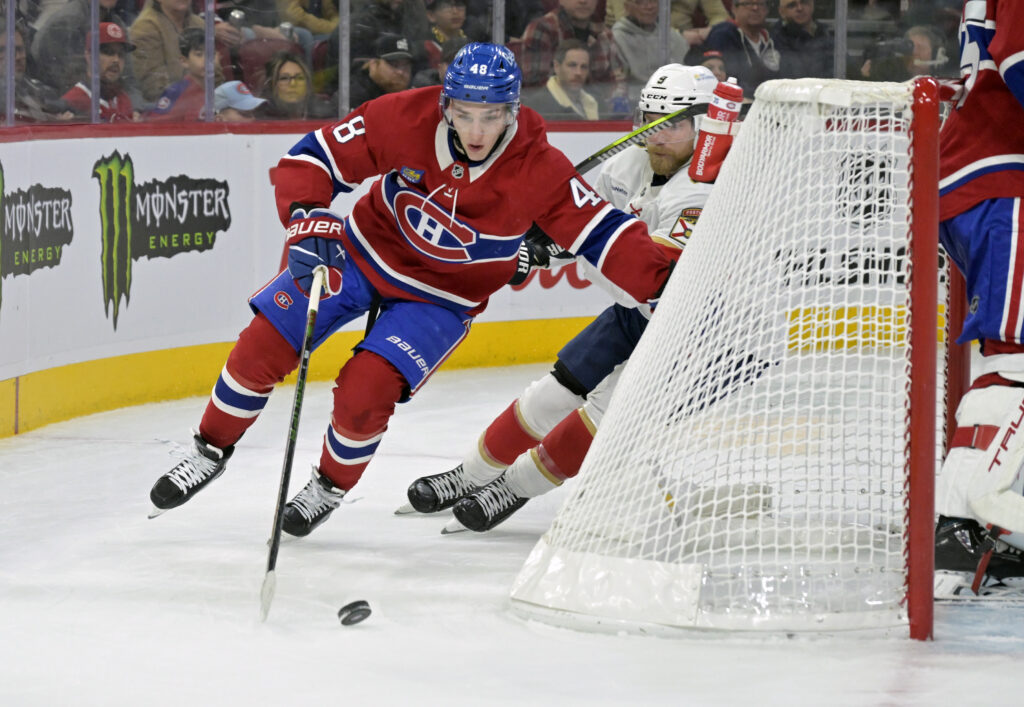It’s the kind of contract negotiation that should be easy. You have a 21-year-old phenom, a dynamic, puck-moving defenseman fresh off a 66-point Calder Trophy-winning season. You have a franchise desperate to lock in its young core for the long haul. The two sides even agree, more or less, on the money. Yet, the extension for Lane Hutson and the Montreal Canadiens is anything but easy. Instead, according to sources close to the situation, the talks have been tense, emotional, and frankly, “a bit of a mess.”
The roadblock isn’t about dollars and cents. It’s about philosophy. It’s a complex, structural disagreement that has pitted modern cap management against player preference, causing a stalemate that has required both sides to call in their heavy hitters. While Lane Hutson says he wants to be a Canadien for life, the path to making that a reality is proving to be far more complicated than anyone anticipated.
Also on the EDGE – Beyond the Rebuild: Why the Montreal Canadiens Are Aiming Higher in 2025-26
The $72 Million Question Isn’t About the Money
Let’s get the numbers out of the way, because they are the least contentious part of this whole affair. After a rookie campaign that saw him quarterback the power play and instantly become one of the most exciting young defenders in the league, Lane Hutson is due for a massive payday. The general consensus, echoed by insiders like Elliotte Friedman, is that an eight-year extension will land somewhere in the neighbourhood of $9 million per season. A deal totaling around $72 million seems to be the accepted financial framework.

The Canadiens’ front office, led by General Manager Kent Hughes, isn’t balking at the price. They are, however, carefully managing their internal salary structure. It’s understood that the final number for Hutson is unlikely to eclipse the eight-year, $76 million ($9.5M AAV) contract recently signed by fellow cornerstone defenseman Noah Dobson. Establishing that internal ceiling is standard practice for a savvy front office building a contender.
So, if the money is effectively settled, why is there no deal? The answer lies not in the how much, but in the how.
A Canadian Conundrum: The RCA Roadblock
The primary sticking point, the “philosophical hurdle” as Friedman aptly termed it, is a complex financial instrument known as a Retirement Compensation Arrangement (RCA). The Canadiens’ front office proposed structuring a portion of Hutson’s contract with deferred payments filtered through this system.
For those unfamiliar, an RCA is essentially a tax-deferral tool often utilized by Canadian-based NHL teams, particularly for their American-born players. From the team’s perspective, it’s a smart, fiscally responsible move. It allows them to manage tax implications and potentially create more financial flexibility under the rigid constraints of the salary cap. It’s a mechanism designed for efficiency in a system where every dollar counts.
Hutson’s camp, however, wants no part of it. They have reportedly rejected the RCA structure outright. While the exact reasons for the rejection remain within the negotiating room, players and their agents often prefer cleaner, more direct compensation. Deferred payment structures, while potentially beneficial from a tax perspective down the line, can introduce complexities and reduce the amount of immediate, liquid cash a player receives. For a young star signing his first mega-deal, the appeal of seeing the money upfront, without intricate deferrals, is powerful. This fundamental disagreement on payment structure is the logjam, and until one side blinks, progress remains stalled.
Calling in the Big Guns
The tense nature of the negotiations has led to a significant development on the player’s side, signaling just how serious the impasse has become. Hutson’s primary agent, Sean Coffey, has been partially moved to the periphery of the discussions. Taking the lead are the more influential power brokers from his agency, Quartexx.
Ryan Barnes, the agency’s Director of U.S. Operations, and the formidable Darren Ferris are now steering the ship for Hutson. When an agent of Ferris’s stature, one of the most influential and hard-nosed negotiators in the game, personally takes over a file, it’s a clear indication that the stakes have been raised. This is no longer a routine negotiation; it’s a high-level corporate standoff. This move ensures the Canadiens are dealing with the agency’s top brass, a group not easily swayed by arguments of corporate synergy or creative accounting. They are there to maximize their client’s earnings in the most direct way possible.
The Long Game: Six Years vs. Eight
While the RCA issue is the main event, a secondary disagreement is simmering over the contract’s term. The Canadiens, like any team with a burgeoning superstar, want to lock Hutson in for the maximum eight years. This would buy up four of his unrestricted free agent (UFA) years and secure their top defenseman through the prime of his career at a cost that will likely look like a bargain in years seven and eight as the salary cap continues to rise.

Hutson’s team, however, is reportedly leaning towards a shorter, six-year term. This is a classic “bet on yourself” strategy. A six-year deal would expire when Hutson is 28 years old, walking him directly to the open market as a UFA in his absolute prime. He would be free to command a king’s ransom from 31 other teams, likely on a much higher salary cap. It’s a strategic play that prioritizes a massive third contract over the immediate security of an eight-year pact. Interestingly, it’s been noted that while the person, Lane Hutson, may prefer the stability of the longest term possible, his representation is tasked with advising the most lucrative business path.
Also on the EDGE – Montreal Canadiens’ Youth Movement Dominates Preseason Narrative
A Matter of When, Not If?
So, where do things stand? According to TSN’s Darren Dreger, fans shouldn’t expect a resolution “anytime soon.” The philosophical divide is real and will require significant compromise. However, a potential opportunity for dialogue is on the horizon, as GM Kent Hughes may meet with Hutson’s agency during an upcoming team road trip to Detroit.
For now, there is no need for panic. Hutson still has one year remaining on his entry-level contract. He will be on the ice in a Canadiens sweater this season, and Hughes has publicly expressed confidence that there is plenty of time to get a deal done. Hutson, for his part, is saying all the right things, stating he wants to stay in Montreal and is trying to remain “pretty hands-off” with the process.
Ultimately, the overwhelming expectation is that a deal will be reached. The Canadiens cannot afford to alienate their Calder-winning defenseman, and Hutson’s camp knows that the biggest guaranteed offer will come from Montreal. But the journey to that signature has exposed a fundamental tension in modern contract negotiations. Before the ink can dry on the contract that will define the Canadiens’ blue line for the next decade, a crucial philosophical gap must be bridged.
Created with the aid of Gemini AI
